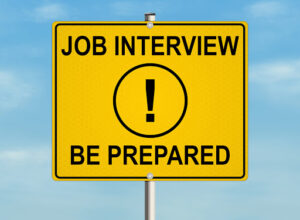How to have a stress-free job interview
If you have only been hoping to have a stress-free job interview, then know you are not alone. Job interviews tend to evoke considerable anxiety and stress in candidates for many reasons. It can be from a fear of the unknown, being required to think on the spot or the pressure of competing. It’s probably safe to say that many people look forward to interviewing as much as they look forward to a trip to the dentist. The key to reducing interview anxiety and having a stress-free job interview is to find the root of the real problem and work on a remedy.
Whining about an under-skilled interviewer won’t help you.
It’s not uncommon for a candidate to leave an interview completely unsure of their performance. The interviewer may have been inattentive or too talkative, and their questions may have seemed like they were from left field. The job may have turned out to be entirely different from how the description was understood. Any of these conditions may or may not be true. But even though saying you “didn’t want the job anyway” might make you feel better, you could be missing the point. Ultimately, declaring sour grapes or whining about an under-skilled interviewer won’t help you succeed the next time. The best way to ensure your next interview is stress-free is to address what only you can change.
A job interview can be a rewarding and fun experience.
A job interview is not inherently a negative experience. When it goes well, it can be a rewarding and fun experience. It can be the opportunity to look someone in the eye, have a normal conversation and truly find common ground. An interview is your chance to actually prove you are a fit. Interviews don’t have to be a dreaded exchange.
So let’s narrow down the reasons for some fairly common issues experienced by candidates. If you have had anxiety during an interview, it might be because you:
- Lack confidence.
- Didn’t know much about the organization before the interview.
- Made assumptions about the role that proved to be incorrect.
- Were caught off guard by some of the questions.
- Weren’t clear about the interviewer’s goal or the intent behind their questions.
- Couldn’t read the interviewer’s responses.
- Thought things had gone really well and you never heard from them again.
It is really possible to have a stress-free interview.
None of these experiences need to remain a mystery. It is really possible to have a stress-free interview.Carefully examine each of your unsuccessful interview experiences. With more advance effort, many issues can be resolved. Here are some remedies:
Go in confident. Confidence comes with knowing you truly are a match for the job. But don’t mistake arrogance for confidence. Arrogance is when someone expects titles or degrees to speak for them. It looks like arrogance when someone only thinks they’re able to do the job, but can’t elaborate. Confidence is when someone easily describes what they have done and how. Don’t go into an interview believing an interviewer should assume anything about you. Be willing and open to discuss your specific skills and experience.
Understand the goals of the organization and how you can contribute.
Research. One sure way to answer questions confidently is to thoroughly understand the goals of the organization and how you can contribute. You can find out many details about their mission, products, services, customers and employees through online research. Knowing more about all of these areas will allow you to speak to specific scenarios that resonate with the interviewer. Go a step further. Speak to people in the company before you interview. Find out what the culture is truly like, vs. what is stated on the website.The more you know going in, the less stressful the interview will be.
Know what is required to do the job. Don’t assume you know what a job requires. If you are guessing about what the job entails, or simply think you can do it, you’re not ready for an interview. If you fully understand what the job entails, you’ll have a stronger case to present in the interview. You’ll need to be able to describe examples of how you have used specific, required skills. You’ll need to clearly illustrate that you can do this Being qualified and being competitive are two separate concepts. People who have done the job (not just held a title) still have to be able to describe how they did the work and what they produced.
Prepare!
Don’t get caught off guard. Prepare! Assuming you’ll be ready for an interview before you really are can be a big mistake. Casually reviewing the job description the night before and thinking of potential responses to a few key questions isn’t enough. Careful preparation for a stress-free job interview takes weeks. Review your resume and the job description side by side. Make sure you’re using relevant examples to demonstrate your ability to do the job. Write out answers to typical interview questions. Scripting helps you get your thoughts clear. It helps you to avoid using negative or misleading language. It also helps you recognize when some questions are simply alternate ways of eliciting the same information. Scripted answers shouldn’t sound canned. The more you practice, the more authentic your answers will be. Practicing with someone familiar with your industry or role can help your words become more second nature.
Stay focused on solving whatever problem they have presented.
Understand the interviewer’s goal. They need you — you need them. If you are truly a “fit,” then the goal works for both of you. Do as much as you can in advance to make sure it is a match. They’re being paid to make a good hiring decision. If they seem combative, it could be a test. Understand what might happen in the nature of your daily work and be prepared to demonstrate how you will cope. Calmly addressing a conflict is far more productive than becoming argumentative. Help make their job easier by being prepared, responsive and thorough. If the questions they ask seem outlandish, then calmly ask clarifying questions. Stay focused on solving whatever problem they have presented. Show them you can do the job, want to do the job and you will get along with others.
Pay attention.
Listen carefully and learn to read cues. Some novice interviewers may be as stressed about the interview as you are. Their poker face may be a sign they are simply trying to appear calm or they may have been taught to remain expressionless. They might continue to nod even when you have completely gone off track. Having a strong banter going is not the same as proving you are a good investment. And just because you didn’t get a negative reaction, it does not necessarily mean everything went well. Sometimes subtle points are missed in the heat of a situation. Pay attention. If you can read their expression and see that you misinterpreted their intent, you can go back and address a missed point.
Address missteps. It is far too common for someone to describe what they thought was an “awesome” job interview. But after asking only a few key questions, I can predict the outcome. They won’t be hearing from the company again. Don’t assume all went well and nothing more is needed. Sometimes it is possible to clarify a misstep later in the interview or you can do damage control with your thank you. There are many reasons to send a well-crafted thank you note following an interview. In addition to making it evident that you heard them, it can also be an opportunity to clarify a badly stated answer.
Debrief your interview with the guidance of a professional coach or trusted colleague.
The first step in turning your job interview anxiety into a stress-free, positive experience is to become aware of what needs to change. The most surefire way to ensure a stress-free, successful job interview is to prepare in advance and debrief your interview with the guidance of a professional coach or trusted colleague. A coach or experienced colleague can help you understand where you’ve previously gone off in a ditch. They may also be able to help with damage control immediately after an interview if something was misstated or overlooked. With professional guidance, you may be able to correct a bad impression, push a situation back in your favor or help you get it right next time around. It is definitely worth the investment to make certain your next interview results in an offer.
For more great advice from Sherri on this topic, check out her Unbeatable Interviewing Techniques webinar and follow her on LinkedIn.









